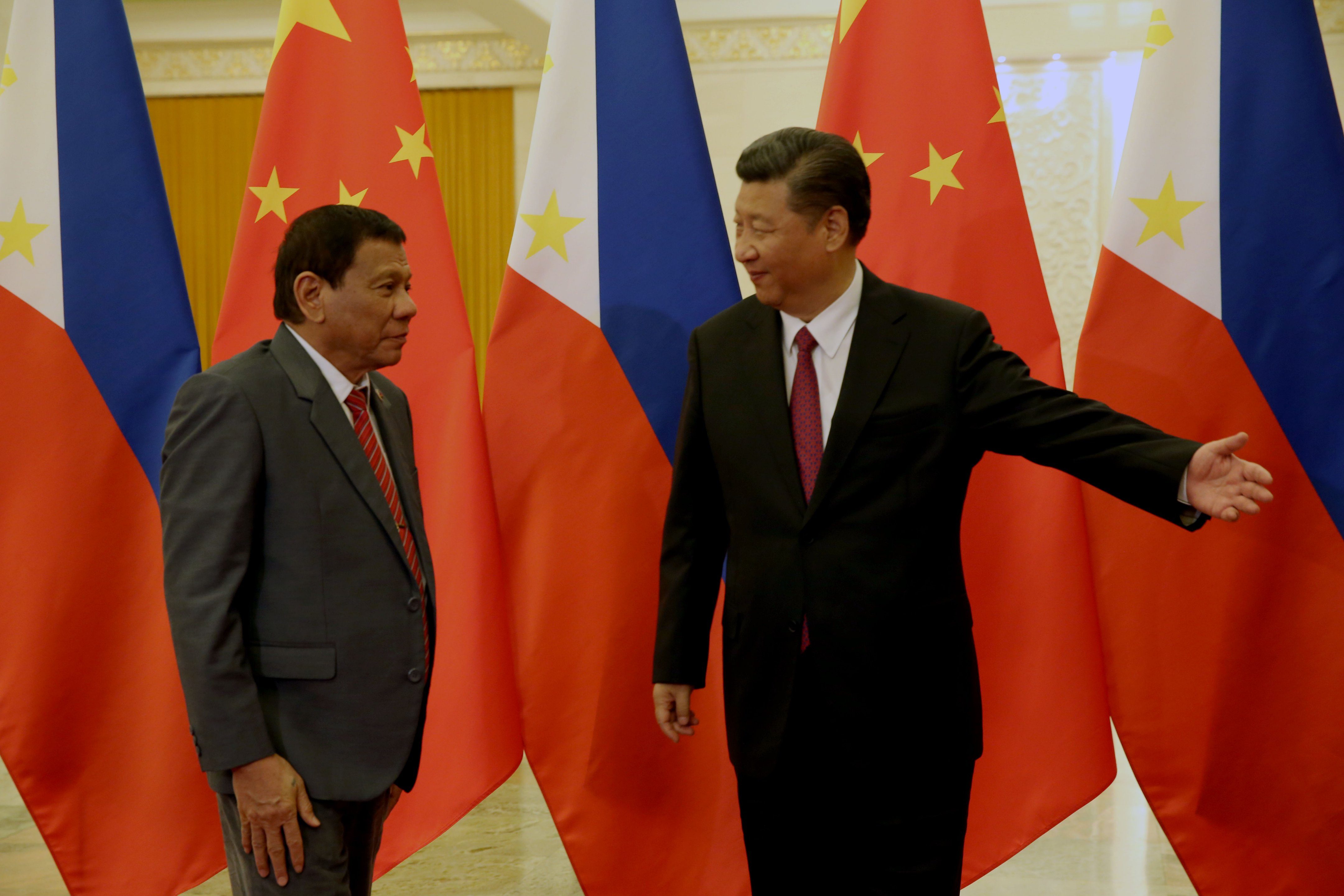SUMMARY
This is AI generated summarization, which may have errors. For context, always refer to the full article.

Close to marking its first year in office, the Duterte administration has turned around the country’s relations with China in a number of ways. Departing from the previous government’s strong opposition to China’s expansive claims and assertive actions in the South China Sea, President Rodrigo Duterte has downplayed the territorial and maritime disputes in favor of pursuing close economic and political ties with China.
This shift has been rewarded by pledges of major fund infusions in support of the Philippine government’s infrastructure development, with a long wishlist of construction projects (including roads, bridges, railways, industrial zones, ports, flood control, etc.) now in the pipeline or in various stages of negotiation. Filipino fishermen have started returning to their normal fishing activities in the vicinity of Scarborough Shoal, albeit under close watch by Chinese Coast Guard vessels.
Instead of China’s past efforts to diplomatically isolate the Philippines after Manila filed an arbitration suit seeking to protect its own maritime entitlements under international law, it now sees the Philippines as a welcome partner in its major diplomatic initiatives such as the Asian Infrastructure Investment Bank and the Belt and Road Initiative (BRI). China has also apparently come around to the idea of signing with ASEAN a Code of Conduct to regulate activities in the South China Sea, although at best that is still bound to be a protracted process (and at worst, an exercise in futility).
While island construction activities in the reefs held by China continued unabated, including on Mischief Reef which the arbitration ruling acknowledged to be subject to the Philippines’ EEZ rights, there have been no reports of major provocative actions that had become almost daily media fare in previous years – PLA-Navy and Coast Guard presence, military exercises, harassment and intimidation of other countries’ resource-related activities, massive fishing and coral reef destruction, oil rig challenges, psychological warfare conducted through official media mouthpieces, and the like.
No new construction activities are under way on Scarborough Shoal, which some would attribute to the United States and Philippines signalling that this would be a “red line” that China would do best not to cross. Instead, official channels of bilateral dialogue between Manila and Beijing have resumed and new ones have opened up, including early resumption of discussions on the dispute itself as announced during Duterte’s second visit to Beijing (May 13-15) to participate in the BRI Summit.
Can relations between Manila and Beijing truly have transformed overnight, considering how close the two governments came to the brink of outright hostility just a little over a year ago? Can the definition of the two nations’ vital interests change so drastically that they can simply turn a new page in history and start on a clean slate? Or do the goals remain the same – even though the strategies taken by both sides have taken a significant turn?
Duterte’s strategy of de-emphasizing and compartmentalizing, while not abandoning, the territorial and maritime issues, is a wise move that can pay off if done smartly.
By delinking economic relations from management of the disputes, Manila can benefit from economic links with Beijing at a time when sustained high growth and investor confidence in the Philippines coincides with a massive drive by China to invest in global infrastructure buildup and trade, industrial and financial connectivity programs as part of the BRI. The challenge will be to see that China itself separates the two aspects of relations, since we have seen it try to use economic leverage in the past (via travel bans and suspension of banana imports) for political ends.
Duterte’s shift in China policy also reduces what used to be open disagreement within ASEAN over handling of the disputes in the relations with China, but at the same time forces some of the other stakeholders (including some who were free-riding on the Aquino administration’s efforts) to shoulder more of the responsibility to ensure progress on the issue, thus easing pressure on the Philippines.
Fortuitous developments
Despite some minor revision, security and other relations with the US remain strong, being highly institutionalized, while security cooperation with Japan and other countries are growing. Military-to-military contacts with China, which were quite active during the Ramos to Arroyo administrations, have also resumed, hopefully leading to renewed confidence-building and reduced risk of miscalculation.

The policy shift may or may not reflect a fully thought-out strategy, but thus far its relatively successful outcomes have also relied on fortuitous developments well beyond Duterte’s control. Serendipity played a role.
One factor was the hard-won arbitration ruling itself, which came within the first twelve days of Duterte’s taking the helm of government. The favorable ruling for the Philippines is now part of international jurisprudence, whether the Duterte government pushes for full compliance now or later. Because the ruling is final and binding, Manila is as much duty-bound as China is, to comply with it and see it through. Aquino’s successful “lawfare” (or legal ‘warfare’) has opened a new platform for management and resolution of the disputes, one that the current or any future governments of the Philippines and China should pursue (preferably sooner rather than later, but when conditions are favorable), if they are genuinely committed to rule of law in the international system.
The second serendipitous event was the election of US President Donald Trump. China-US relations had been moving in a dangerous downward spiral, and in the course of Washington’s supposed show of support for its Philippine ally, Manila’s disputes with Beijing ran the risk of becoming less about the former’s maritime rights and resource entitlements and more about major powers’ competition for influence and right to conduct military activities at sea. With Trump at the helm, and considering his administration’s yet unclear foreign policy towards China (other than seeking China’s help in constraining North Korea’s renewed belligerence), Beijing has reason to act more studiously and with greater caution in the South China Sea. After all, Trump may provide opportunities for China to attain strategic gains even larger in importance than control of the South China Sea (perhaps leading to its aspiration for a “new type of major country relations”). On the other hand, because US commitment to engage in the South China Sea is also unclear under Trump (whether on behalf of allies or purely on its own behalf), the Philippines has reason to push the thought of military solutions to the backburner and return to a mainly diplomatic track.
The third fortuitous development for Duterte is Xi Jinping’s launch of the bold and ambitious “Belt and Road Initiative”. BRI is a major campaign for China-led economic, industrial, financial, technological, and sociocultural connectivity (mainly through infrastructure support) that would link 65 countries from Asia, Europe and Africa, ostensibly to spur development and growth in light of the slow recovery of the global economy from the 2007 crisis. It is also intended to stimulate growth in China’s backward frontier provinces, and to put China’s excess manufacturing capacity and foreign currency surplus into profitable use.
Good fortune for Duterte
The successful implementation of the program will elevate China further into the ranks of leading countries, but it relies as much on China’s powers of persuasion, soft power diplomacy and internationalist credentials as on its massive financial resources.
This will likely translate into China downplaying nationalist emotions and territorial claims, or restraining military adventurism, possibly giving Duterte breathing space both for repairing relations with China, and reorienting the alliance with the US away from a China focus and towards what he feels are more convergent objectives at the moment.
The overall interests of both China and the Philippines may not have changed, but the (rather serendipitous) changes in circumstances unarguably paved the way for adjustments in Philippine strategy in directions preferred by the new President, and no doubt by China.
If the 3 factors I mentioned together represent a spate of good fortune for Duterte, I dare argue that China, too, has serendipity to thank, for allowing it an opportunity to pull back from the brink and change course. Whether China fully makes use of this opportunity or not is still an open-ended question, but the opportunity is there.
For China, good fortune’s name is Duterte. But that’s another story.
The author is a professor at the Asian Center, University of the Philippines and president of Asia Pacific Pathways to Progress Foundation.
Add a comment
How does this make you feel?
There are no comments yet. Add your comment to start the conversation.